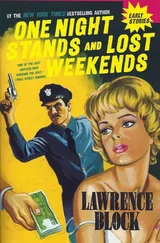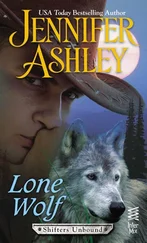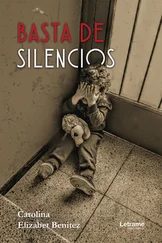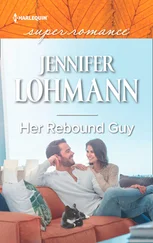The woman started, knocking over the pile of dead cans she had constructed. When she looked up at him, his spine tingled in response. Even through sunglasses, the force of her stare caught him off guard. As far as he knew, she wasn’t supposed to be on his father’s farm, much less here shooting cans. Or was it his farm now? Or maybe it was Max’s farm. It didn’t matter who owned the property at the moment. This woman wasn’t supposed to be here.
She straightened, then reached up to her ears with both hands and pulled. Two small bits of orange foam bounced off her shirt, just above the rise of her breasts.
Of course she couldn’t hear him. She’d been wearing earplugs. It had been so long since Trey had stood in his backyard and shot at cans that he’d forgotten some of the basic safety precautions.
She marched up to him, her stride as direct as her stare. After they were no longer in shouting distance, she lifted her sunglasses off her face, folded them into the neck of her T-shirt and said, “You must be Trey Harris.”
The woman walked quickly. By the time she had finished speaking, she was directly in front of him. The part of Trey that had been admiring her backside also noticed the peaks of her nipples pressed against her shirt—even if it was a warm, sunny January day in North Carolina, it was still a January day. But Trey wasn’t a complete caveman; he also noticed that she had clear, mint-green eyes.
“You have the advantage over me,” he said, focusing his attention on her arresting eyes. For all that the rest of her was easy to look at, her eyes—and the straightforward way she looked at him—were mesmerizing. She was daring him to look away and he couldn’t. “You know who I am, but I don’t know who you are.”
Or what you’re doing here.
Her straight, pale eyebrows crossed in confusion. “I’m Max Backstrom,” she said without offering her hand.
“You’re Max?” A couple years ago, Trey had asked Kelly if his boyfriend had known he was spending so much time with Max. His brother had choked with laughter—and now Trey knew why.
Her confusion didn’t last. She lifted one eyebrow, this time daring him to argue with her, and he didn’t accept this challenge, either. This woman was his father’s farmer.
* * *
THE ANGER THAT had been warming Max from the inside retreated enough for her to feel the cool breeze on her bare arms. After the one glance at her breasts, Trey had managed to keep his eyes on her face for the rest of the conversation, but she’d noticed that one glance. And his surprise at learning her name. She knew that father and son had barely spoken for years, but she had a hard time believing not one of those conversations had included the basic fact that Hank was leasing his land to a woman. Or at the very least, that Kelly hadn’t told him. She had thought the brothers kept in touch through the occasional email.
The next puff of wind brought a strand of hair across her face and goose bumps to her arms. She debated continuing to stand there in her T-shirt just to see how long he could keep his eyes off her erect nipples, but good sense won out. The ownership of the farm was in flux and she needed Trey’s support. Plus she was cold. She pulled her sweatshirt off the back of the chair and shoved her arms into the sleeves before zipping it up all the way.
Finally buffeted against the chill and Trey’s shock, she said, “Max is short for Maxine.” Which was short for Maxine Patch, but she only used the full ridiculousness of her name when signing contracts, and they weren’t at that stage in their relationship yet. “Let me clean this up and then we can have a cup of tea and talk.”
Having known Trey’s father and seeing the shine on the son’s loafers, Max hadn’t expected him to follow her up the small hill to collect cans. Today was sunny, but the past few days had been nothing but rain. Some of the ground was soil. Some of it was red clay. All of it was mud. Cans clinked against one another as they tossed them into the box. Her supply of targets was going to be much smaller now that Hank Harris was dead.
“Where to?” Trey’s arms were wrapped around the box of cans and he was looking around. Through his eyes, the farm in winter probably didn’t seem like much to look at. The only greens were the loblolly pines at the edges of the fields and the hardiest bits of grasses. Everything else was brown either because it was dirt or because it was dead. Even the winter cover crops were fading.
She bit her lip before the urge to defend the bareness of the land in winter escaped her mouth. This man didn’t care about the land. Hank had said neither of his sons had cared about the land. Of course, Hank had only cared that the land was still in his possession—“got a responsibility,” he used to say, though Max had never been certain who the responsibility had been to. Surely the ancestors who’d first settled this plot of land would have wanted to see it farmed more than they would have wanted to see Hank stand on the dirt with his thumbs tucked into his belt loops.
Max didn’t know where Trey stood on the responsibility line, and she hoped he saw that the land was only useful if it was being used. And she could use it. “Put them in the back of my truck,” she instructed. “They need to go to recycling.”
He nodded then walked off in the direction of her ancient blue pickup truck. If he was concerned about the mud on his fancy shoes, he didn’t show it. Max sighed. Trey wasn’t the only one who’d apparently made judgments based on little information. Neither was he the only one who’d made those judgments poorly. All she had known of Trey was that he rarely talked to his father or brother and wore suits to work. Hank had emphasized the last fact every time he talked about his older son, saying, “I can’t believe I let Noreen raise that boy up to wear suits to work,” with his tone somewhere between disgust and pride. Since Max had occasionally heard Hank brag to his mechanic about Trey, she gave Hank the benefit of the doubt and credited his disgust as a cover for his true feelings.
Max had seen the crisp white collar of Trey’s shirt poking up from the navy blue of his striped sweater and forgotten that he’d spent his childhood on this farm. His full, nearly black hair, cut in a conservative style, thick, black eyebrows and clean-shaven face fit her image of preppy Capitol Hill policy wonk better than son of a Southern good ole boy. But add some stubble to his square jaw and change the intelligent curiosity in Trey’s dark brown eyes to Hank’s amused condescension and the resemblance was clear. Replace his flat stomach with a beer belly, add a ratty #3 Earnhardt cap and twenty-five years, plus a stint in Vietnam, and Trey would be the spitting image of his father.
Her uncharitable thoughts were unfair to Hank. The man had been a jerk, but he’d also leased her land to farm for cheap and helped fix up one of the tobacco barns for housing. Hank may not have understood the changing face of farming in central North Carolina, but he wasn’t going to stand in its way. Besides, the mess she was in now was her fault, as much as Hank’s. She should have pressed him harder on the specifics of the ownership of the farm once he passed away, but she hadn’t wanted to risk pissing him off and losing the farm while he was alive.
No, that wasn’t fair to Hank, either. She’d been afraid to learn he had changed his mind about writing the lease into the will and that she would have to make another plan. Now she was stuck with her three-year plan, and no idea if she would need another by December. She wished she had her mother’s ability to leap into the unknown and reinvent herself every couple years, but—like her father—Max was a farmer, plodding along through life.
Читать дальше












